North Star NSC42 User Manual
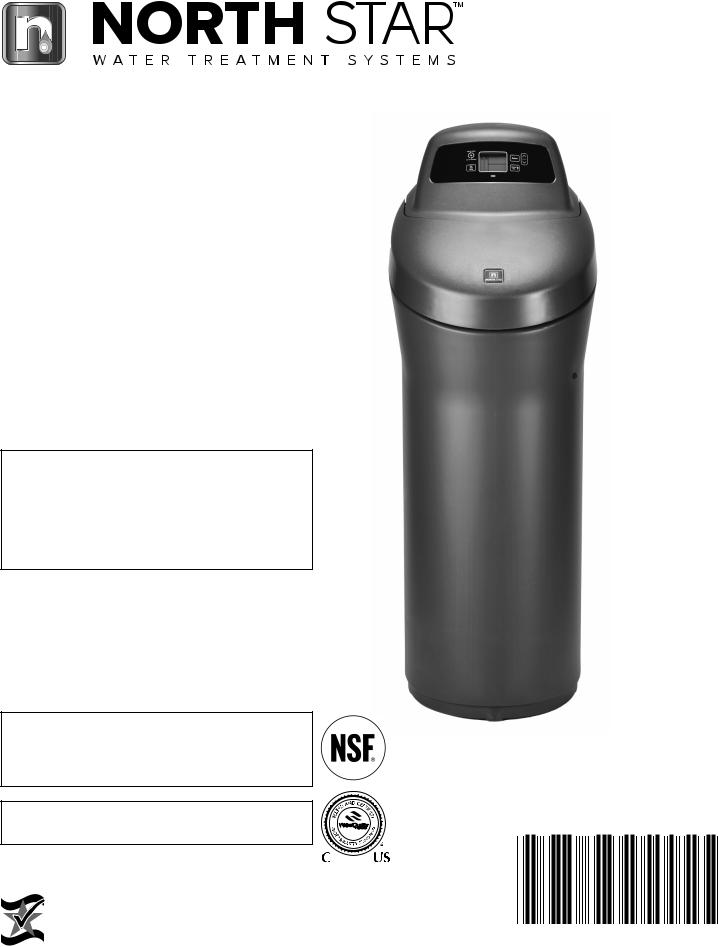
Model NSC42
How to install, operate and maintain your Demand Controlled Water Softener
If you have any questions or concerns when installing, operating or maintaining your water softener, contact us at: info@northstarwater.com
or visit www.northstarwater.com
System tested and certified by NSF International against NSF/ANSI Standard 44
for hardness reduction and efficiency, and certified to NSF/ANSI Standard 372.
System tested and certified by the
Water Quality Association against CSA B483.1.
|
Manufactured and warranted by |
Designed, Engineered & |
North Star Water Treatment Systems |
Assembled in the U.S.A. |
1890 Woodlane Drive |
|
Woodbury, MN 55125 |
Installation and Operation Manual
7371127 (Rev. B 9/1/18)

TABLE OF CONTENTS
Page
Specifications & Performance Claims . . . . . . . . . . . . . . . . . . . . . . . . . . . . . . . . . . . . . . . . . . . . . . . . . . . . . . . . . . . . 3
Inspect Shipment . . . . . . . . . . . . . . . . . . . . . . . . . . . . . . . . . . . . . . . . . . . . . . . . . . . . . . . . . . . . . . . . . . . . . . . . . . . . 4
Dimensions . . . . . . . . . . . . . . . . . . . . . . . . . . . . . . . . . . . . . . . . . . . . . . . . . . . . . . . . . . . . . . . . . . . . . . . . . . . . . . . . 4
Before You Start . . . . . . . . . . . . . . . . . . . . . . . . . . . . . . . . . . . . . . . . . . . . . . . . . . . . . . . . . . . . . . . . . . . . . . . . . . . . 5
Water Conditioning Information . . . . . . . . . . . . . . . . . . . . . . . . . . . . . . . . . . . . . . . . . . . . . . . . . . . . . . . . . . . . . . . . . 5
Installation Requirements . . . . . . . . . . . . . . . . . . . . . . . . . . . . . . . . . . . . . . . . . . . . . . . . . . . . . . . . . . . . . . . . . . . . 6-7
Installation Instructions . . . . . . . . . . . . . . . . . . . . . . . . . . . . . . . . . . . . . . . . . . . . . . . . . . . . . . . . . . . . . . . . . . . . . 8-11
Programming the Water Softener . . . . . . . . . . . . . . . . . . . . . . . . . . . . . . . . . . . . . . . . . . . . . . . . . . . . . . . . . . . 12-13
Controller Features . . . . . . . . . . . . . . . . . . . . . . . . . . . . . . . . . . . . . . . . . . . . . . . . . . . . . . . . . . . . . . . . . . . . . . 14-17
Routine Maintenance . . . . . . . . . . . . . . . . . . . . . . . . . . . . . . . . . . . . . . . . . . . . . . . . . . . . . . . . . . . . . . . . . . . . . 18-19
Troubleshooting . . . . . . . . . . . . . . . . . . . . . . . . . . . . . . . . . . . . . . . . . . . . . . . . . . . . . . . . . . . . . . . . . . . . . . . . . 20-22
Wiring Schematic . . . . . . . . . . . . . . . . . . . . . . . . . . . . . . . . . . . . . . . . . . . . . . . . . . . . . . . . . . . . . . . . . . . . . . . . . . 23
Exploded View & Parts List . . . . . . . . . . . . . . . . . . . . . . . . . . . . . . . . . . . . . . . . . . . . . . . . . . . . . . . . . . . . . . . . 24-27
WATER SOFTENER WARRANTY
Warrantor: North Star Water Treatment Systems, 1890 Woodlane Drive, Woodbury, MN 55125
Warrantor guarantees, to the original owner, that:One Year Full Warranty:
● For a period of one (1) year from the date of purchase, all parts will be free from defects in materials and workmanship and will perform their normal functions.
Limited Warranties:
● For a period of ten (10) years from the date of purchase, the salt storage tank and fiberglass mineral tank will not rust, corrode, leak, burst, or in any other manner, fail to perform their proper functions.
● For a period of three (3) years from the date of purchase, the electronic control board and valve body will be free of defects in materials and workmanship and will perform their normal functions.
If, during such respective period, a part proves to be defective, Warrantor will ship a replacement part directly to your home, without charge. General Provisions
Damage to any part of this water softener because of misuse, misapplication, neglect, alteration, accident, installation or operation contrary to our printed instructions, or damage caused by any unusual force of nature such as, but not limited to, freezing, flood, hurricane, tornado, or earthquake is not covered by this warranty. In all such cases, regular parts and service charges will apply.
We assume no warranty liability in connection with this water softener other than specified herein. This warranty is in lieu of all other warranties, expressed or implied, including warranties of fitness for a particular purpose. We do not authorize any person or representative to assume for us any other obligations on the sale of this water softener.
Should a defect or malfunction occur, contact your contractor. If you are unable to contact your contractor, return the part, freight prepaid, directly to the factory at the address below. Enclose with the part a full description of the problem, with your name, full address, date purchased, model and serial numbers, and selling contractor's name and address. We will repair or replace the part and return it to you at no cost if our repair department determines it to be defective under the terms of the warranty.
This warranty gives you specific legal rights and you may have other rights which vary from state to state. This water softener is manufactured by
North Star Water Treatment Systems, 1890 Woodlane Drive, Woodbury, MN 55125
Questions? Contact us at: info@northstarwater.com
2

Specifications & Performance Claims
This model is efficiency rated. The efficiency rating is valid only at the minimum salt dose. This system has a demand initiated regeneration (D.I.R.) feature that complies with specific performance specifications intended to min- imize the amount of regenerant brine and water used in their operation.
This water softener has a rated softener efficiency of not less than 3,350 grains of total hardness exchange per pound of salt (based on sodium chloride) and shall not deliver more salt than its listed rating or be operated at a sustained maximum service flow rate greater than its listed rating. This system has been proven to deliver soft water for at least ten continuous minutes at the rated service flow rate. The rated salt efficiency is measured by laboratory tests described in NSF/ANSI Standard 44. These tests represent the maximum possible efficiency that the system can achieve. Operational efficiency is the actual efficiency after the system has been installed. It is typically less than the rated efficiency, due to individual application factors including water hardness, water usage, and other contaminants that reduce a softener's capacity.
|
|
|
Model NSC42 |
|
|
Model Code |
nS42 |
|
|
|
12,400 @ 2.5 lbs. |
Rated Softening Capacity (Grains @ Salt Dose) |
33,300 @ 9.5 lbs. |
|
42,100 @ 16.3 lbs. |
|
|
Rated Efficiency (Grains/Pound of Salt @ Minimum Salt Dose) |
4,940 @ 2.5 lbs. |
|
|
Water Used During Regeneration @ Minimum Salt Dose |
2.5 gallons / 1,000 grains |
|
|
Total Water Used Per Regeneration @ Maximum Salt Dose |
45.9 gallons |
|
|
Rated Service Flow Rate |
9.9 gpm |
|
|
Amount of High Capacity Ion Exchange Resin |
1.20 cu. ft. |
|
|
Pressure Drop at Rated Service Flow |
11.9 psig |
|
|
Intermittent Flow Rate @ 15 psi* |
11.5 gpm |
|
|
Water Supply Max. Hardness |
120 gpg |
|
|
Water Supply Max. Clear Water Iron |
11 ppm** |
|
|
Water Pressure Limits (min. / max.) |
20 - 125 PSI (138 - 862 kPa)*** |
|
|
Water Temperature Limits (min. / max.) |
40 - 120 °F (5 - 49 °C) |
|
|
Minimum Water Supply Flow Rate |
3 gpm (11.4 lpm) |
|
|
Maximum Drain Flow Rate |
2.0 gpm (7.6 lpm) |
*Intermittent flow rate does not represent the maximum service flow rate used for determining the softener’s rated capacity and efficiency. Continuous operation at flow rates greater than the service flow rate may affect capacity and efficiency performance.
**Capacity to reduce clear water iron is substantiated by laboratory test data. State of Wisconsin requires additional treatment if water supply contains clear water iron exceeding 5 ppm.
***Canada working pressure: 1.4 - 7.0 kg/cm².
This system conforms to NSF/ANSI Standard 44 for the specific performance claims as verified and substantiated by test data.
Variable Salt Dose: The salt dose is selected by the electronic controls at regeneration time based on the amount needed.
Questions? Contact us at: info@northstarwater.com or visit www.northstarwater.com
3
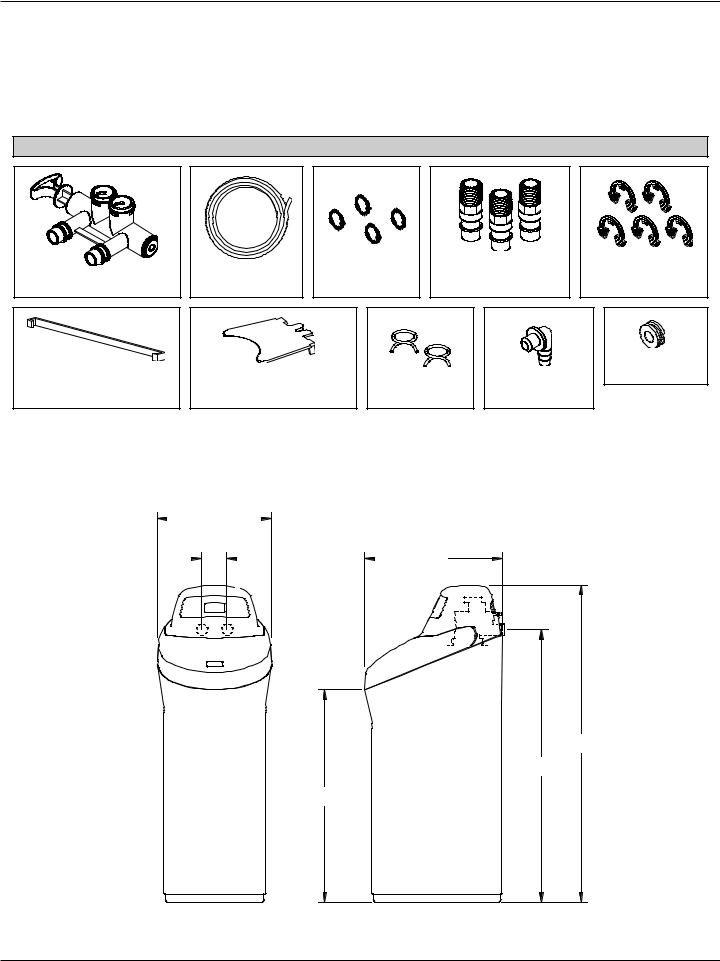
Inspect Shipment
The parts required to assemble and install the unit are included in a bag. Thoroughly check the water soften- er for possible shipping damage and parts loss. Also inspect and note any damage to the shipping carton.
Remove and discard (or recycle) all packing materials. To avoid loss of small parts, we suggest you keep the small parts in the parts bag until you are ready to use them.
Packing List
Bypass Valve |
Cover Lock |
(for shipping only) |
Drain Hose |
O-rings |
Installation Adaptors |
(including 1 spare) |
Clips |
(including 1 spare) |
Rim Insert |
|
|
Grommet |
Hose Clamps |
Adaptor Elbow |
|
|
(for shipping only) |
FIG. 1 |
||
|
|
|
Dimensions
|
|
|
|
|
|
|
|
|
|
|
|
|
17"” |
|
|
|
|
|
|
|
|
|
|
|
|
|
|
|
|
|
||
3-3/4” |
|
|
|
|
||||||
3- / |
" |
|
|
|
|
|
|
|||
|
|
|
|
|
|
|
|
|
|
21"” |
OUT |
|
IN |
|
|
||||||
|
|
|
|
|
||||||
OUT |
|
IN |
|
|
|
|
||||
INI - OUT
41-1/2"” 48"”
34”"
FRONT VIEW |
SIDE VIEW |
FIG. 2 |
|
F |
IEW |
I IEW |
|
4
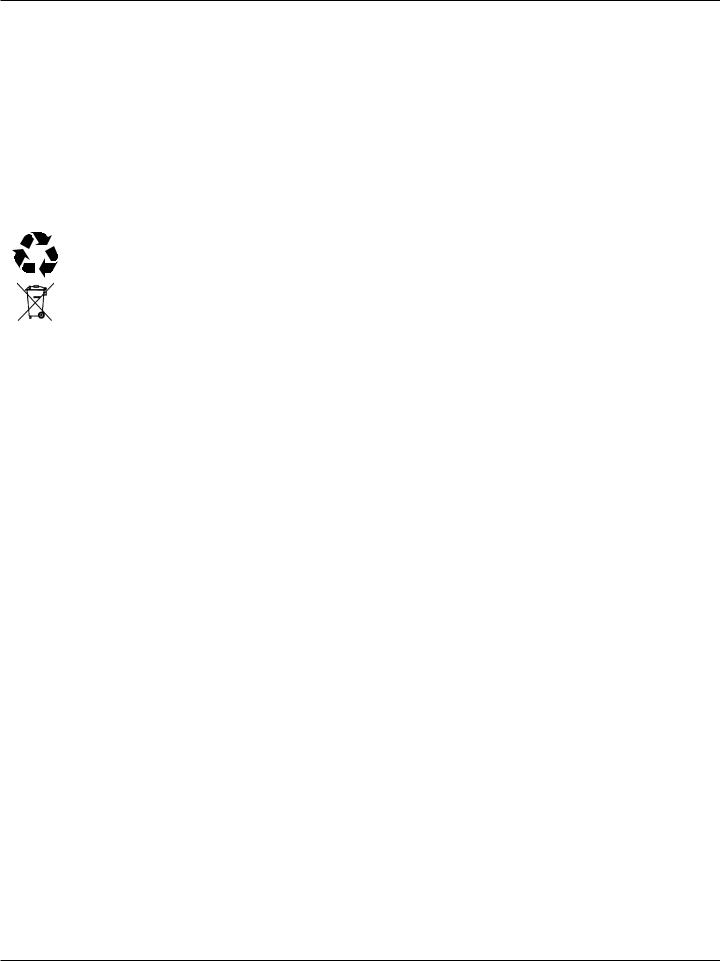
Before You Start
= The water softener requires a minimum water flow of 3 gallons per minute at the inlet. Maximum allowable inlet water pressure is 125 psi. If daytime pressure is over 80 psi, nighttime pressure may exceed the maximum. Use a pressure reducing valve if necessary (Adding a pressure reducing valve may reduce the flow). If your home is equipped with a back flow preventer, an expansion tank must be installed in accordance with local codes and laws.
= The water softener works on 24V DC electrical power, supplied by a direct plug-in power supply (included). Be sure to use the included power supply and plug it into a nominal 120V, 60 Hz household outlet that is in a dry location only, grounded and properly protected by an overcurrent device such as a circuit breaker or fuse.
= Do not use this system to treat water that is microbiologically unsafe or of unknown quality without adequate disinfection upstream or downstream of the system.
European Directive 2002/96/EC requires all electrical and electronic equipment to be disposed of according to Waste Electrical and Electronic Equipment (WEEE) requirements. This directive or similar laws are in place nationally and can vary from region to region. Please refer to your state and local laws for proper disposal of this equipment.
Water Conditioning Information
IRON
Iron in water can cause stains on clothing and plumbing fixtures. It can negatively affect the taste of food, drinking water, and other beverages. Iron in water is measured in parts per million (ppm). The total* ppm of iron, and type or types*, is determined by chemical analysis. Four different types of iron in water are:
= Ferrous (clear water) iron = Ferric (red water) iron
= Bacterial and organically bound iron
= Colloidal and inorganically bound iron (ferrous or ferric)
Ferrous (clear water) iron is soluble and dissolves in water. This water softener will reduce moderate amounts of this type of iron (see specifications).** Ferrous (clear water) iron is usually detected by taking a sample of water in a clear bottle or glass. Immediately after taking, the sample is clear. As the water sample stands, it gradually clouds and turns slightly yellow or brown as air oxidizes the iron. This usually occurs in 15 to 30 minutes.
When using the softener to reduce Ferrous (clear water) iron, add 5 grains to the hardness setting for every 1 ppm of Ferrous (clear water) iron. See "Set Water Hardness Number" section.
Ferric (red water), and bacterial and organically bound irons are insoluble. This water softener will not remove ferric or bacterial iron. This iron is visible
immediately when drawn from a faucet because it has oxidized before reaching the home. It appears as small cloudy yellow, orange, or reddish suspended particles. After the water stands for a period of time, the particles settle to the bottom of the container. Generally these irons are removed from water by filtration. Chlorination is also recommended for bacterial iron.
Colloidal and inorganically bound iron is of ferric or ferrous form that will not filter or exchange out of water. This water softener will not remove colloidal iron. In some instances, treatment may improve colloidal iron water. Colloidal iron water usually has a yellow appearance when drawn. After standing for several hours, the color persists and the iron does not settle, but remains suspended in the water.
SEDIMENT
Sediment is fine, foreign material particles suspended in water. This water softener will not remove sediment. This material is most often clay or silt. Extreme amounts of sediment may give the water a cloudy appearance. A sediment filter installed upstream of the water softener normally corrects this situation.
* Water may contain one or more of the four types of iron and any combination of these. Total iron is the sum of the contents.
** Capacity to reduce clear water iron is substantiated by laboratory test data.
5
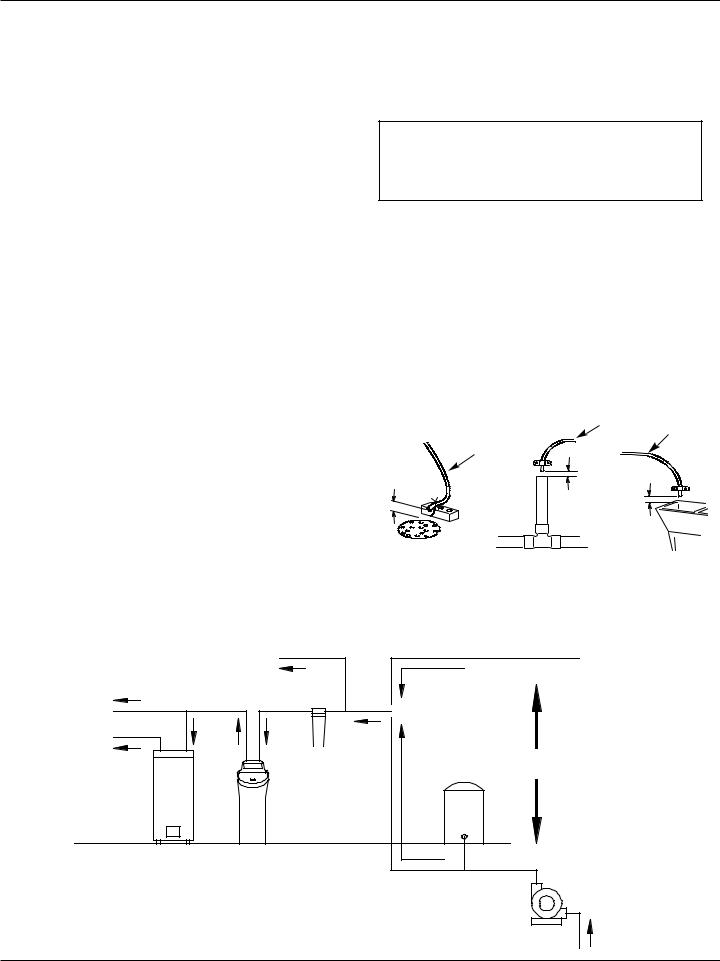
Installation Requirements
LOCATION REQUIREMENTS |
PLUMBING CODES |
|
|
||||||
Consider all of the following when selecting an installa- |
All plumbing must be completed in accordance with |
||||||||
tion location for the water softener. |
|
national, state and local plumbing codes. |
|
||||||
= Do not locate the water softener where freezing |
In the state of Massachusetts: The Commonwealth |
||||||||
temperatures occur. Do not attempt to treat water |
|||||||||
of Massachusetts plumbing code 248-CMR shall |
|||||||||
over 120ºF. Freezing temperatures or hot water |
|||||||||
be adhered to. A licensed plumber shall be used |
|||||||||
damage voids the warranty. |
|
||||||||
|
for this installation. |
|
|
|
|||||
= To condition all water in the home, install the water |
|
|
|
||||||
|
|
|
|
|
|
||||
softener close to the water supply inlet, and |
AIR GAP REQUIREMENTS |
|
|
||||||
upstream of all other plumbing connections, except |
|
|
|||||||
outside water pipes. Outside faucets should remain |
A drain is needed for the water discharged from the |
||||||||
on hard water to avoid wasting conditioned water |
|||||||||
valve during the softener’s regeneration cycle (See |
|||||||||
and salt. |
|
|
|||||||
|
|
Figure 3). A floor drain, close to the water softener, is |
|||||||
= A nearby drain is needed to carry away regenera- |
|||||||||
preferred. A laundry tub, standpipe, etc. are other |
|||||||||
tion discharge (drain) water. Use a floor drain, |
drain options. Secure valve drain hose in place. |
||||||||
laundry tub, sump, standpipe, or other options |
Leave an air gap of 1-1/2” between the end of the |
||||||||
(check your local codes). See "Air Gap |
hose and the drain. This gap is needed to prevent |
||||||||
Requirements" and "Valve Drain Requirements" |
backflow of sewer water into the water softener. Do |
||||||||
sections. |
|
|
not put the end of the drain hose into the drain. |
|
|||||
= The water softener works on 24V DC electrical |
|
|
|
|
Drain |
|
|||
power, supplied by a direct plug-in power supply |
|
|
|
|
Drain |
||||
(included). Provide nearby a 120V, 60Hz electrical |
|
Drain |
|
Hose |
Hose |
||||
outlet in accordance with NEC and local codes. |
|
|
|
|
|||||
1-1/2” |
Hose |
|
|
|
|||||
= Always install the water softener between the water |
|
|
|
|
|
||||
air gap |
|
|
|
|
|
||||
inlet and water heater. Any other installed water |
|
|
|
|
|
||||
|
|
|
|
|
|
||||
conditioning equipment should be installed between |
|
|
|
1-1/2” |
|
|
|||
the water inlet and water softener (See Figure 4 |
|
|
|
|
|
||||
|
|
|
air gap |
1-1/2” |
|
||||
below). |
|
|
|
|
|
|
|
||
= Avoid installing in direct sunlight. Excessive sun |
|
|
|
|
air gap |
|
|||
|
|
|
|
|
|
||||
heat may cause distortion or other damage to non- |
FLOOR DRAIN |
STANDPIPE |
LAUNDRY TUB |
||||||
metallic parts. |
|
|
|||||||
|
|
|
|
|
|
|
FIG. 3 |
||
|
|
|
|
|
|
|
|
||
THE PROPER ORDER TO INSTALL WATER TREATMENT EQUIPMENT |
|
||||||||
|
Untreated Water to |
|
City Water Supply |
|
|
||||
Cold Water |
Outside Faucets |
|
|
|
|||||
|
|
|
|
|
|
||||
|
|
|
|
|
|
|
|
||
to House |
|
|
|
|
|
|
|
|
|
Hot Water |
|
Optional |
|
Pressure |
OR |
|
|
||
to House |
|
|
|
|
|||||
|
|
Tank |
|
|
|
||||
|
|
Sediment |
|
|
|
|
|
|
|
|
|
Filter |
|
|
|
|
|
|
|
|
Water |
Water |
|
|
Well Water Supply |
|
|
||
|
Heater |
Softener |
|
|
|
|
|
|
|
|
|
|
|
|
Well |
|
|
|
|
|
|
|
|
|
Pump |
|
|
|
|
|
|
|
|
|
|
|
|
FIG. 4 |
|
|
|
|
6 |
|
|
|
|
|
|
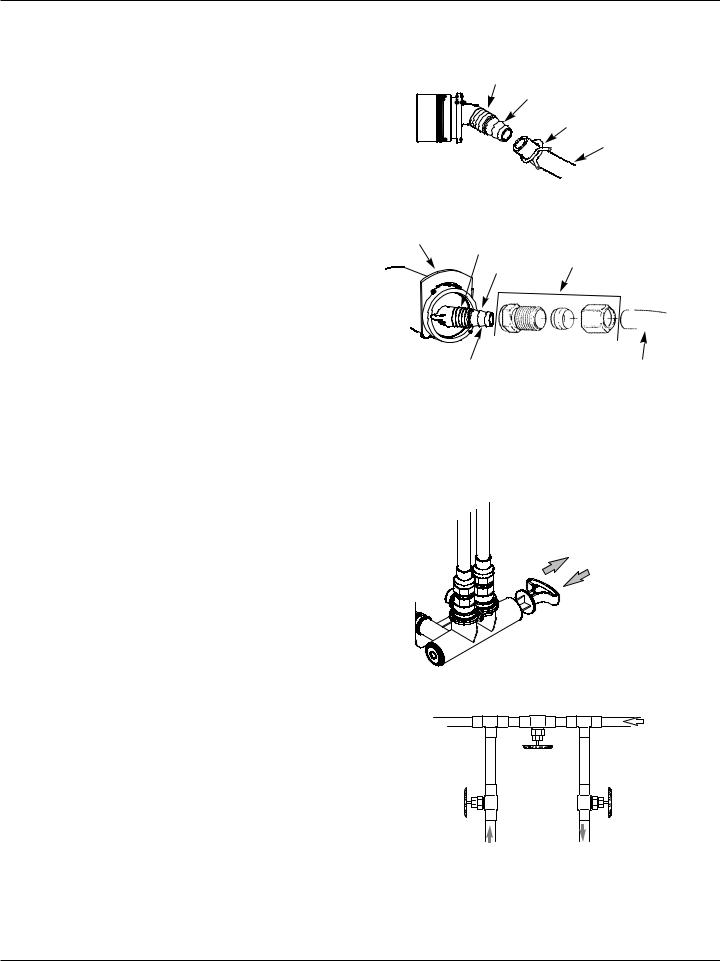
Installation Requirements
VALVE DRAIN REQUIREMENTS
Using the flexible drain hose (included), measure and cut to the length needed. Flexible drain hose is not allowed in all localities (check your plumbing codes). If local codes do not allow use of a flexible drain hose, a rigid valve drain run must be used. Purchase a compression fitting (1/4 NPT x 1/2 in. minimum tube) and 1/2" tubing from your local hardware store. Plumb a rigid drain as needed (See Figure 6).
NOTE: Avoid drain hose runs longer than 30 feet. Avoid elevating the hose more than 8 feet above the floor. Make the valve drain line as short and direct as possible.
1/4” NPT |
|
Thread |
Barbs for 3/8” |
|
I.D. Tubing |
Hose Clamp
Drain Hose
FIG. 5
Clip |
1/4 NPT |
Compression Fitting. |
|
Threads |
1/4 NPT x 1/2” O.D. |
||
|
|||
|
Barbs |
Tube (not included) |
|
|
|
Cut barbs from drain fit- |
1/2” Outside Dia. |
ting (pull clip to remove |
Copper Tube |
fitting from valve) |
(not included) |
|
FIG. 6 |
INLET / OUTLET PLUMBING OPTIONS
Always install either a single bypass valve (provided), as shown in Figure 7, or, if desired, parts for a 3 valve bypass system (not included) can be purchased and assembled, as shown in Figure 8. Bypass valves allow you to turn off water to the softener for maintenance if needed, but still have water in house pipes. Use:
= Copper pipe = Threaded pipe
= PEX (Crosslinked Polyethylene) pipe = CPVC plastic pipe
= Other pipe approved for use with potable water IMPORTANT: Do not solder with plumbing attached to
installation adaptors and single bypass valve. Soldering heat will damage the adaptors and valve.
SINGLE BYPASS VALVE
|
|
Pull out for “Service” |
|
|
|
(Soft water) |
|
|
|
Push in for |
|
|
|
“Bypass” |
|
|
|
|
FIG. 7 |
|
3 VALVE BYPASS |
|
|
|
Bypass |
|
|
|
Valve |
|
|
Outlet |
|
Inlet |
|
Valve |
|
Valve |
|
|
From Water |
To Water |
FIG. 8 |
|
Softener |
Softener |
|
7

Installation Instructions
TYPICAL INSTALLATION
To Outside
Hard Water
Faucets
Water Softener
Valve
To
Controller
Plug-in
Power
Supply
Valve Drain
Elbow
|
pe |
Conditioned |
in |
WaterPi |
|
Ma |
|
Water |
Inlet
Overflow
Drain Elbow
|
Pipe |
Clips |
1” NPT Sweat |
|
Adaptor (not |
|
included) |
|
1” NPT |
|
Threaded |
Outlet |
Adaptor |
|
O-ring |
Valve Drain |
Salt Storage |
Lubricated |
|
|
|||
O-ring |
|
|
|||||
Hose* |
Tank Overflow |
|
|
||||
|
|
|
|||||
|
Hose* |
|
|
|
|
Single |
|
|
|
|
|
|
|
Bypass Valve |
|
|
|
Secure Valve Drain Hose |
|
||||
|
|
in place over Floor Drain |
|
||||
*Do not connect the |
|
|
1-1/2” |
|
NOTE: See “Air Gap Requirements” section. |
||
water softener valve drain |
|
|
|
||||
tubing to the salt storage |
|
|
air gap |
|
FIG. 9 |
||
tank overflow hose. |
Floor Drain |
|
|
|
|
||
TURN OFF WATER SUPPLY |
|
|
2. Install the brine tank overflow grommet and elbow |
||||
1. Close the main water supply valve, located near the |
|
|
into the 13/16” diameter hole in the back of the salt |
||||
|
|
storage tank wall. |
|
||||
well pump or water meter. |
|
|
|
|
|
|
|
2. Shut off the electric or fuel supply to the water heater. |
MOVE THE UNIT INTO PLACE |
|
|||||
3. Open all faucets to drain all water from house pipes. |
|
||||||
1. Move the water softener into the desired location. |
|||||||
NOTE: Be sure not to drain water from the water |
|
||||||
|
|
Set it on a solid, level surface. |
|
||||
heater, as damage to the water heater ele- |
|
|
|
||||
|
IMPORTANT: Do not place shims directly under the |
||||||
ments could result. |
|
|
|||||
|
|
|
|
|
salt storage tank to level the softener. |
||
ASSEMBLY |
|
|
|
|
The weight of the tank, when full of |
||
|
|
|
|
water and salt, may cause the tank to |
|||
1. North Star models are factory assembled. During |
|
|
|
fracture at the shim. |
|
||
installation, unsnap and remove the top cover, |
continued on next page |
|
together with the salt lid, to expose the softener |
||
|
||
valve assembly. Set them aside to prevent damage. |
|
|
Check the brinewell to be sure it is secured and ver- |
|
|
tical (See Figure 11). |
|
8

Installation Instructions
continued from previous page
2. Visually check and remove any debris from the water softener valve inlet and outlet ports.
3. Make sure the turbine assembly spins freely in the "out" port of the valve (See Figure 10).
4. If not already done, put a light coating of silicone grease on the single bypass valve o-rings.
5. Push the single bypass valve into the softener valve as far as it will go. Snap the two large holding clips into place, from the top down as shown in Figures 12 & 13.
IMPORTANT: Be sure the clips snap firmly into place so the single bypass valve will not pull out.
COMPLETE INLET AND OUTLET PLUMBING
Measure, cut, and loosely assemble pipe and fittings from the main water pipe to the inlet and outlet ports of the water softener valve. Be sure to keep fittings fully together, and pipes squared and straight.
Be sure hard water supply pipe goes to the water softener valve inlet side.
NOTE: Inlet and outlet are marked on the water softener valve. Trace the water flow direction to be sure hard water is to inlet.
IMPORTANT: Be sure to fit, align and support all plumbing to prevent putting stress on the water softener valve inlet and outlet. Undue stress from misaligned or unsupported plumbing may cause damage to the valve.
Complete the inlet and outlet plumbing for the type of pipes you will be using.
Turbine
Support
Top Cover |
Nozzle & Venturi |
|
|
Assembly |
|
Salt Lid |
Brine Tank |
|
|
Overflow |
|
|
Grommet |
|
Brinewell |
Brine Tank |
|
Cover |
||
Overflow |
||
|
||
|
Elbow |
|
Brinewell |
|
|
|
13/16” Hole |
|
|
Brine |
|
|
Tubing |
|
Stand |
Salt |
|
Storage |
||
Tube |
Tank |
|
Brine |
Float |
|
Stem |
||
Valve |
||
|
||
|
FIG. 11 |
 Clip
Clip
Channel
Single Bypass Valve
FIG. 12
Correct Assembly
Clip
|
|
|
Outside diameter |
Outside diameter |
|
|
|
|
of water softener |
of clip channel on |
FIG. 13 |
Valve Outlet |
Turbine |
|
valve inlet & outlet |
single bypass valve |
|
|
|
|
|
||
|
|
FIG. 10 |
NOTE: Be sure all 3 tabs of the clip go through the matching |
||
|
|
|
holes on the water softener valve inlet or outlet, and |
||
|
|
|
fully into the channel on the single bypass valve. |
||
|
|
|
Make sure that the tabs are fully seated. |
|
|
9
